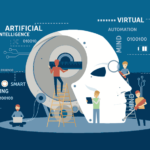Key Takeaways
- Internships in AI fields provide practical experience and industry insights, bridging the gap between theory and practice.
- Conducting research in AI can enhance problem-solving skills and deepen technical expertise, contributing to innovation.
- Networking through internships cultivates professional relationships crucial for personal growth and career opportunities.
Table of Contents
- The Value of Real-World Experience
- Building Your Network Through Internships
- Enhancing Skills with Research Projects
- Making Yourself Marketable
- How to Find the Right Opportunities
- Navigating AI Industry Trends
The Value of Real-World Experience
Pursuing a Bachelor of Science in Artificial Intelligence is an exciting journey with theoretical lessons and academic challenges. However, bridging the gap between learned knowledge and its practical application is pivotal. Internships offer an invaluable avenue for this transition, allowing students to immerse themselves in industry-standard environments and tackle real-world problems. Internships encourage the development of critical abilities, including time management, teamwork, and effective communication, in addition to knowledge application.
Students can observe firsthand the business dynamics, the speed of AI projects, and the complexity of technology thanks to these encounters. As they learn to overcome obstacles like scalability, resource management, and customer expectations, students become more than just participants in ongoing initiatives they become essential contributors. Additionally, internships give students a better grasp of the different positions in the AI business, empowering them to choose their specializations and career routes with knowledge.
Building Your Network Through Internships
Networking, an often-underestimated component of career development, is crucial in future job prospects. Internships offer a prime opportunity to cultivate these relationships early on. These connections provide professional insights and offer mentorship from experienced industry veterans, which can be integral to personal and professional development. A well-nurtured network can facilitate access to unadvertised positions and provide valuable references. According to several studies, roughly 80% of job placements come through networking.
Utilizing LinkedIn skillfully enables students to maintain these relationships post-internship, ensuring they evolve into long-term professional alliances. Additionally, networking with peers can yield collaborative opportunities, fostering a culture of shared learning and innovation. Engaging with seasoned professionals also allows students to gain insights into emerging industry trends and challenges, providing an invaluable perspective that can guide their professional growth and strategic career moves.
Enhancing Skills with Research Projects
Though internships provide environments for applying existing knowledge, research projects propel students into new realms of discovery, particularly in a field as expansive as AI. Research stimulates curiosity and requires tackling technical challenges that still need defined answers.
Working on research projects enables students to contribute to cutting-edge developments by hypothesizing, testing, and refining innovative solutions. It also encourages interdisciplinary approaches, merging computer science, cognitive science, and data analytics expertise to drive comprehensive problem-solving.
Through research, students gain confidence in independent inquiry and hone skills necessary for academic publication or technological advancement. These projects may lead to opportunities such as presenting findings at conferences, contributing to patents, or collaborating with industry leaders, further solidifying an individual’s reputation as an emerging expert in AI.
Moreover, research experiences cultivate a mindset of continuous learning and adaptation, preparing students to tackle future AI challenges with creativity and critical thinking.
Making Yourself Marketable
In a competitive job market, candidates must be distinct and adaptive. Exposure to internships and research equips students with a robust portfolio demonstrating their ability to function effectively in varied settings. Employers often seek candidates with a proven track record of tackling real-world issues, adapting to diverse team dynamics, and utilizing innovative approaches to problem-solving. Experiences gained from these opportunities demonstrate technical skills, resilience, and a willingness to learn continuously.
They underscore a readiness to contribute meaningfully to projects from the outset. Furthermore, these experiences allow candidates to align their career aspirations with roles that match their skills and professional interests, ultimately resulting in enhanced job satisfaction and career progression.
Crafting a narrative highlighting the breadth and depth of one’s experiences can be a powerful tool in distinguishing oneself in interviews and networking events, showcasing a well-rounded candidate ready to take on pivotal roles within the AI landscape.
How to Find the Right Opportunities
Finding suitable internships or research opportunities requires strategic planning and a proactive approach. Students should leverage university resources, such as career counseling and alumni networks, to explore potential opportunities aligned with their interests. Additionally, participating in job fairs and internship platforms can help identify roles that cater to specific career aspirations.
Tailoring resumes to highlight relevant skills and experiences and crafting cover letters that reflect a genuine passion for AI are crucial steps in this process. Preparing for interviews by articulating how past experiences have prepared one for future challenges can significantly enhance one’s prospects.
Persistence and a clear vision of career objectives ensure that students find opportunities that refine their skills and lay the groundwork for a fulfilling career in AI. Attending workshops and industry seminars can also provide networking opportunities and insights into available positions, underscoring the importance of a multi-faceted approach to job searching.
Navigating AI Industry Trends
Staying informed about AI industry trends is essential for academic and professional success. The landscape of AI technology is in constant flux, with new developments emerging rapidly. Awareness of these trends can guide one’s education and career path, keeping it aligned with industry demands.
Engaging with the latest research, participating in AI communities, and attending workshops or seminars provide insights into future areas of growth and challenge in AI. These activities offer knowledge and perspective on ethical and societal implications, enabling individuals to contribute responsibly to future innovations.
Understanding these trends ensures relevancy within a sector characterized by continuous evolution, positioning individuals to lead and adapt as thought leaders in their future careers. Students and professionals can anticipate and shape their roles within AI by staying attuned to changes and advancements, ensuring they remain at the forefront of technological innovation.











